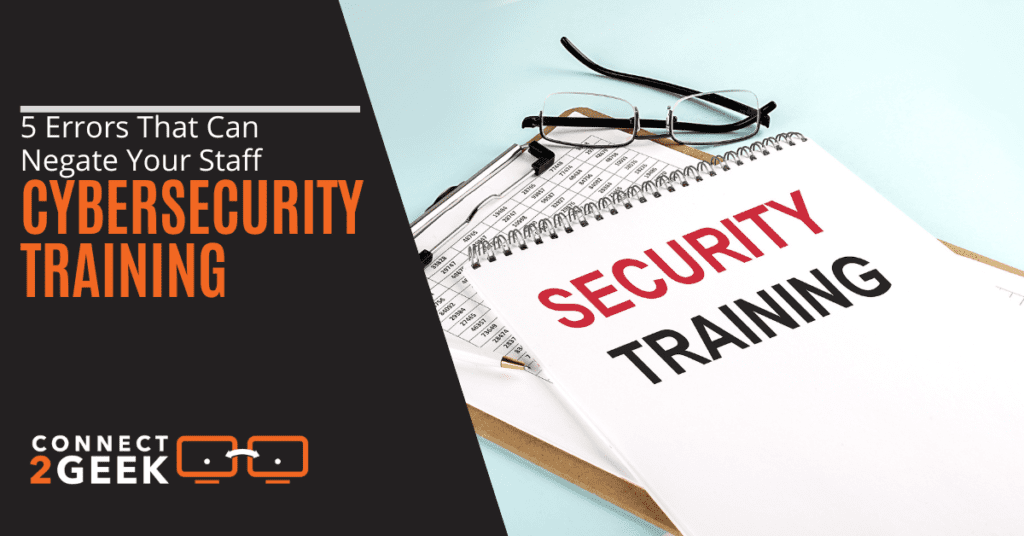
Cybercriminals are becoming more intelligent and savvier in their attacks. And firms with no or little cybersecurity training programs are open to imminent cyber-attacks.
According to research, 93 percent of results show that an external cybercriminal can breach a company’s database – that is how serious it is. These cybercriminals target large firms like healthcare, law firms, real estate agencies, etc. Implementing cybersecurity training for your employees is one thing, but it is another to implement this training and get constant positive cyber change. Can your staff distinguish between a genuine link from the CFO and a fake one?
Why Cybersecurity Training is Necessary for Your Staff
Employees at firms must begin taking steps to strengthen their cyber defenses. Most cybercrime situations start small and don’t escalate into a full-fledged cyber security breach till it is too late.
Therefore, cybersecurity training assists in preventing data breaches by educating employees on necessary information. The following are the reasons why every firm should invest in staff cybersecurity training programs :
To Combat Problems Caused by Human Error
95% of cybersecurity breaches result from human error, and firewalls cannot prevent your staff from falling victim to a phishing email. Your organization could spend millions on pioneering security software. Still, none will matter if your employees are not adequately trained in detecting and responding to cyberattacks.
To Avoid Incurring Financial Losses for your Company
Employees who receive the best security awareness training are more likely to identify possible risks and report any inbound issues. Operational interruptions inside the firm may be avoided. IT security personnel can detect threats before they escalate, causing apparent financial harm. All of this, however, is only feasible if everyone collaborates, which occurs when there is adequate cyber security training.
Compliance
Compliance training, such as GDPR, HIPAA, PDPA, and PCI-DSS, is included in cyber security training. Compliance supports policy development and helps workers understand their responsibilities while managing organizational information. Even if your firm is not subject to specific compliance obligations, your workers should get acquainted with them. Cyber security training packages are useful for both cybersecurity and compliance training.
Mistakes You May Be Making That Negates Your Staff Cybersecurity Training
Every point where an employee interacts with your internal systems provides a potential entry point for cyber thieves. You must adequately educate and train your staff to defend against these dangers and make your IT security team enjoy a lasting experience in your organization. The following are mistakes to avoid when it comes to cybersecurity training for employees.
1. Not Implementing Regular Cyber Security Training
It’s easy to give your firm a complete cybersecurity training program and then call it quits since you’ve checked the box. However, this is a mistake since the sector is constantly evolving, and cybercriminals are also improving.
Training on cyber security cannot be static. It must be updated frequently. As a result, your personnel must be frequently updated to keep current and informed of new schemes and scams to avoid. To be prepared, make cybersecurity training a regular part of your organization’s routine.
2. Generic and Uninspired Cyber Security Training
For your training to be effective, it should be delivered in a way that resonates with your audience and alters their behavior. Building a tailored curriculum that speaks directly to your company and its particular circumstances will be far more effective than a generic, off-the-shelf program.
Furthermore, you want the training to be intriguing and exciting enough to keep your staff engaged.
3. Avoiding the “No-Trust” Approach in Training
A No-trust strategy states that every user or connected device should be considered unreliable unless proven otherwise. Therefore, before engaging in any activity, the staff should always try to confirm the integrity of the connection.
Some businesses consider this unduly obscure, but their anxiety haunts them later, nullifying the employees’ training.
4. Criticizing the Employees
The employees should not be criticized for not learning quickly. For fear of punishment, individuals may hesitate to raise inquiries and conceal anything they did that could jeopardize the firm.
Anyone successful in their profession may learn to enhance cyber security and recognize and respond to social engineering assaults. Blaming or criticizing employees for not learning quickly and correctly misses the reality.
5. Using Information From a Single Campaign During Training
With over 3.4 billion phishing assaults daily, it’s reasonable to expect that at least a million of them differ in complexity, language, approach, or tactics.
Unfortunately, no one phishing simulation can adequately depict the risk to a business. It is doubtful that relying on a single phishing model outcome would yield reliable results through thorough training.
Another key factor to consider is that various employees react differently to threats. Not only because of their readiness, training, position, tenure, or even education level, but also because phishing attempts are contextual. The solution to this is to implement varieties of cyber training programs.
Improve Your IT Security With CONNECT2GEEK
Contact us at Connect2Geek if you need assistance with training, network support, and data recovery or if you want to converse with specialists who can put you on the right track.
